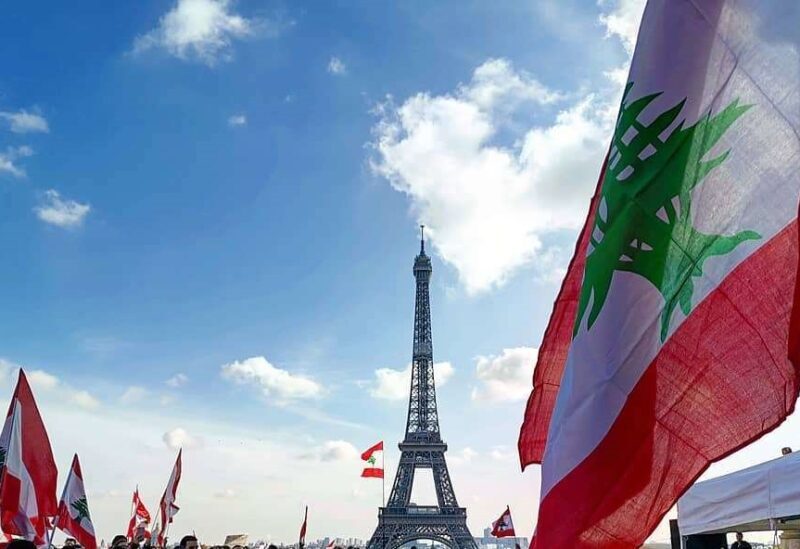
Lebanese flag in France
Western diplomatic sources note that the French foreign policy towards Lebanon in particular bears a kind of “dualism.” France believes that its reliance with Lebanon will achieve acceptable stability for it amid the tense situation surrounding the region, and the international-Iranian struggle for influence and the future of the Iranian nuclear program.
The sources stress the importance of this duality in the French role towards Lebanon, which is going through the most serious historical and existential crisis. This duality is embodied in the distinction that exists between the “Elysee” and the “Quai d’Orsay,” that is, the Ministry of Foreign Affairs with regard to the specifics of the situation, while foreign policy proceeds under a unified principle. President Emmanuel Macron, who is currently working on his election campaign, will find that his role will increase with his country’s assumption of the presidency of the European Union on January 1, for a period of six months. He will seek to exploit France’s position to produce several goals, including those related to the Lebanese situation. He will also use the influence of the European Union presidency to pressure the Gulf states in order to support Lebanon.
Basically, France is keen on Lebanon’s respect for international resolutions, and it is like a “pen holder” for Lebanon in the Security Council, where it writes the first drafts of international resolutions about it, and confronts it in the Council for the sake of Lebanon and in order to maintain a certain balance within it.
But at the same time, sources say, there is a differentiation in French foreign policy, between the policy of the Elysee and the policy of “Quai d’Orsay”. It seems clear that the president’s policy is characterized by being open to everything related to Iran and “Hezbollah” based on the idea of dealing with Lebanon realistically or to some extent pragmatic. From the way France approached the issue of weapons, Macron did not have the priority to discuss this issue when launching his famous initiative to save Lebanon following the explosion of the port of Beirut. But this did not mean that he abandoned international resolutions. Rather, his priority was to form a government that would take control of matters and put the country on the right track. Finding a solution for Lebanon’s main problem, the illegal weapons, will be discussed later. Despite the failure of his initiative, Macron continued to seek to form a government, which was re-formed with specifications that do not match the French rescue initiative.
France accepted this on the grounds that having a government is better than not having it at a time when Lebanon is under the weight of an unprecedented political and economic crisis, and that the government that Iran allowed to be formed after Macron’s effort with it, can work to achieve reforms, and can prepare for parliamentary elections that the international society support for change.
Macron also continued his contacts with Iran and with “Hezbollah” regarding all files, including those relating to negotiations with the International Monetary Fund, the resumption of cabinet sessions, and the investigation into the port explosion, and later it is expected that all of this will follow a French-Iranian understanding about not obstructing the Lebanese elections next spring.
Although “Hezbollah” did not comment on the French role in the “Jeddah Declaration,” according to the sources, it was surprised by the French position, as it considers that the dialogue with Paris is ongoing and did not expect “extremism” from it in parallel. But the French say, according to the sources, that their dialogue with Hezbollah is not always positive. On several occasions, the party accepts their proposals, and sometimes rejects them, and sometimes does not provide answers to them.
But the goal of dialogue with him is not to open up to his positions, as much as it is to pressure him to get out of the obstruction that he follows in his approach to the Lebanese files. Since Macron is aware of who the obstructing party is and pursuing diplomacy with it, this does not mean condoning its performance. Rather, the goal is to mediate in order for Lebanon not to slip into the unknown and to maintain an acceptable level of political and security stability.
In parallel, Macron focusses on the threshold of the French presidential election, the interests of large French companies that had previously had investments in Iran after the signing of the nuclear agreement in 2015, believing that if he did not secure markets for these companies, the situation would turn against him in the elections. Which makes him more open to Iran than the Americans.
As for the French Foreign Ministry, “Quai d’Orsay”, its policy is closer to the extreme right in Washington, given that the two are conservative. The priority of the French Foreign Ministry is completely consistent with the priority of the American Foreign Ministry. Thus, there is extremism from the Foreign Ministry that constitutes a red line that French foreign policy cannot cross.